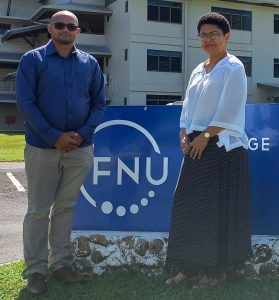

CMNHS Department of Pathology and Medical Lab Science academics Atlesh Nand (left) and Taina Naivalu (right) are involved in a scientific research study to characterise virus diversity in contaminated water samples from Suva focusing mainly on SARS-CoV-2, the virus which causes COVID-19.
The Fiji National University’s (FNU), College of Medicine, Nursing and Health Sciences’ (CMNHS) is involved in a joint multi-institutional research study in Fiji to characterise the virus diversity in contaminated water samples from Suva focusing mainly on SARS-CoV-2, the virus which causes COVID-19.
CMNHS Department of Pathology and Medical Lab Science academics Taina Naivalu and Atlesh Nand have conducted a community-based sample collection and analysis under the guidance of the Principal Investigator Professor Miguel Quiñones-Mateu from the University of Otago.
This study is funded by the University of Otago’s-Otago Global Health Institute (OGHI) and is part of a multinational project aimed at detecting SARS-CoV-2 in contaminated water through a distributed sampling of creeks and rivers in low-to-middle income countries.
The research is conducted by CMNHS staff in collaboration with colleagues from the Joint Clinical Research Centre (Uganda), the University of Otago in New Zealand, Universidad de Antioquia (Colombia), Instituto Venezolano de Investigaciones Cientificas (Venezuela) and Western University in Canada.
According to both Naivalu and Nand, the samples collected from the contaminated water creeks in the Suva area would be tested and transferred to the University of Otago where Nand will further analyse the samples through the use of metagenomics techniques at Quiñones-Mateu lab.
“This research not only benefits the University but the country as well,” Nand said.
Nand further elaborated that the benefits of this research include establishing the protocol to identify the presence of SARS-CoV-2 in the community by detecting the virus in contaminated water. This could then be used in future surveillance projects in Fiji.
“To our knowledge, and according to literature analysis, this type of study has not been performed in Fiji previously and this is a first-of-its-kind. Once completed, this would mean we could publish the first characterisation of viruses detected in contaminated water in Fiji.”
Nand added that the collaboration also strengthened FNU’s partnerships with regional and international counterparts and aligned with one of the University’s Strategic Plan pillars of conducting research with real-world impact.
The research team would like to acknowledge Suva City Council and the University of Otago for coming forward and supporting this research.